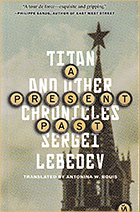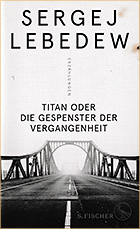Sergei Lebedev
Titan. A Book of Stories
Rights have been aquired by
- Fischer Verlag, Germany
- Claruscuro, Poland
- New Vessel Press, USA
- Head of Zeus, UK
- KRYG Publishing House, Bulgaria
- Keller editore, Italy
The author of five novels, Sergei Lebedev finds his way to a new genre for himself and his readers: the short story.
However, the collection is still a continuation of the themes of his previous books: the loss of historical memory, the ease of forgetting, and the denial of responsibility for the past.
The novelty of the text and the approach lies in the fact that Lebedev explores the historical optics of an unclean conscience by making use of the well-known genre of the ghost story. In his stories, Soviet and post-Soviet state crimes left unpunished pave the way to the other world, where repressed guilt lies in wait, then brings it back to the world of the living by way of mystical images––restless spirits, asking for justice and retribution.
Though unconnected, the stories in the collection are united by a common theme, a common space, and an intuitively recognizable neighborhood of individual plots that form a map, as it were, a guide to the troubles and the historical ghosts that haunt Russia. The classic device from Shakespeare’s Hamlet, the appearance of the villainously murdered king, here becomes a kind of mass phenomenon––the mass eruption of the most firmly rejected matter of the unwanted past.
When this comes to pass, the whole world can and is ready to testify.
Objects that survive great tribulations, abandoned places, and buildings that are merely empty turn out to be able to maintain a connection between different eras, to be witnesses to history, something like messengers from the past.
For example, an old ivory business-card holder (in the story “The Antonov Fire”) becomes fraught with more than just the fate of its owner: it’s a home for those who are no longer alive, their crypt, evidence of their suffering.
Or a huge barn (in the story “The Granary”) made of strong German brick on the outskirts of a Russian village, between fields that give birth only to boulders, pushing them out of the bowels of the earth as their only possible fruit. There is no key to this barn with its old heavy lock and everyone who tries to open it and make use of it in some way is repelled. And the unwanted, illegitimate, “business-trip” kid conceived by the accountant Anna Ivan––so swarthy, “not hers”––won’t speak, but the German cuckoo clock comes to life beneath his gaze, then “recollects” its owners and certain objects from peasant huts. Then Anna’s pretty much dead apple orchard blossoms wildly with no warning whatsoever. And, even after a crushing storm, the garden gives forth abundant fruit, but a cadaverous stench emanates from them and spreads through the village. Only the old watchman Markel understands that the boy must be urgently disposed of… but it’s too late––the barn is open. It’s overflowing with the “thick void” of the fates of dozens of Jews from the village, locked up here during the Second World War on the night before their execution. On that night, Markel was forced to guard the barn.
Retribution always comes, sooner or later. Judge Zheludkov from the story of the same name has long dreamed of the position of deputy chairman of the Supreme Court, and he gets lucky, finds a case in which he can serve the authorities, become needed, can come into his own… The exhumation of the bodies of Polish officers shot by the NKVD might well become an international scandal. Their descendants demand “rehabilitation.” But Zheludkov deals with the case in cunning fashion, bureaucratizes it in such a way that it turns out only the victims themselves can apply for “rehabilitation.” His victory is spoiled by the daughter of one of the dead, an old woman in a wheelchair: she seems to know that she’s come to his court to die. And she turns “the power of her death into a curse,” takes the judge with her to the other side.
Sometimes, the earth refuses to accept the dead––it puffs up, tries to free itself from their sins, pushes them out, splits a huge stone pyramid (in the story “The Obelisk”). As if the creator of this grave monument knew that there would be no peace for him in the next world, that he would tear forth from the belly of the earth, which would not accept his guilt, so he tried to subdue it with the weight of a granite block…
Sergei Lebedev is the only modern writer in Russia who has taken on the task of exhuming memory, of becoming a “clairvoyant of collective memory.” He has been given the gift of “seeing through time.”
And in the cycle “Now The Night is So Bright,” he “sees” retribution, calls out to it. One night, the northern lights descend from the heavens down to the earth, into stone and water, coming into the flesh of trees, coloring everything around them:
“The radiant covers grew heavy, cloudy, merging with the local matter, growing into it; conception and birth all at once, a painful conjugation of worlds, out of which, in ours, arose a form of matter that belonged to nobody here, rootless, ghostly matter, which shapeless and incorporeal ghosts and spirits sought out in order to clothe themselves in it…
“Icons cried and bled that night, memorial candles lit up by themselves; in concert halls, a migratory storm of music was born, then vanished, unborn melodies unwritten by any living person. At the stations, they heard locomotive horns that had long since gone mute. At distant half-stations, at the fences in the meadows, they saw strange trains, unlisted on timetables, as if all the junked locomotives had set off from distant depots––decommissioned wagons that were no longer put out on the line. In subways, especially those that were decrepit, built back in the ‘30s, it seemed to late-night passengers as if empty platforms, where only cleaners were wiping the floors, were actually full of people, as if it were rush hour; it’s crowded, they breathe, whisper, cough, cry out, weep, discuss how to get where’re they’re going, they’re surprised at new lines and stations. In the tunnels outside the windows, passengers could see figures passing across the rails and they quickly sobered up and rushed to get off at a random station, to get some air.
“But, even in the air of the cities, the same whispers were carried, as if the monuments were talking to one another, and it seemed that the boulevards were full, that the illumination burnt with a ghostly, icy, northern light.”
And a great campaign will begin against the bastions of lies, hypocrisy, violence, and murder… the Kremlin, the Lubyanka, and Stalin’s Near Dacha, carefully guarded, as if awaiting their master. And the Great Evil will crumble to dust.
But the most important book about the Gulag is still to be written, as in the story “Titan.” The archives will finally open up and each court case, all those millions of volumes full of grief, torture, and death sentences, will become the largest literary monument in the world, a guarantee that this will never happen again.

